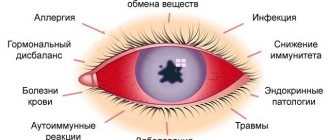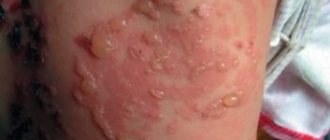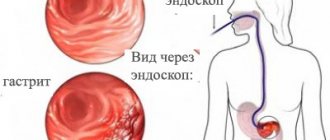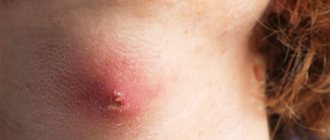Symptoms
Lacunar tonsillitis appears quickly. The obvious and most common symptom is a severe sore throat that gets worse when swallowing.
In addition to a sore throat, lacunar tonsillitis presents symptoms such as:
- Increase in temperature.
- Pain in the head.
- Pain in muscles and joints.
- General weakness of the body.
- Redness on the cheeks.
- Fever, chills in the body.
Description of the disease
Lacunar tonsillitis is the third most severe form of tonsillitis.
Pathology can occur in children aged 1 to 18 years. One episode of the disease lasts on average 10-14 days, if the initial treatment is chosen correctly. The disease develops acutely. The chronic form of lacunar tonsillitis is extremely rare (up to 2%). Due to the massive penetration of bacteria into the palatine tonsils, in the absence of adequate treatment, the risk of complications increases:
- formation of peritonsillar abscesses;
- layering of secondary infection with transition to a septic state (sepsis);
- exacerbation of existing chronic diseases.
One common complication of frequent episodes of sore throat in childhood is acute rheumatic fever (formerly “rheumatism”). It develops due to the ability of bacteria (streptococci) to remain in the tissues of the tonsils for a long time. Pathogens trigger autoimmune processes in the body, which leads to the appearance of characteristic symptoms. The most unfavorable are lesions of the cardiovascular system with the formation of acquired heart defects. Therefore, it is so important to carry out adequate and timely treatment of lacunar tonsillitis when symptoms are identified.
Causes
Lacunar tonsillitis is caused by bacteria (staphylococcus, streptococcus) or viruses, fungi and is an infectious disease. This type of sore throat is transmitted through the air from a sick person to a healthy one. The development of the disease may also continue due to:
- Hypothermia of the body.
- Allergic reactions.
- Chronic diseases of organs and systems.
- Experiences, stress.
- Lack of normal, full sleep.
- Deterioration of immunity.
- Poor, poor quality food.
- Diseases of the ENT organs.
- Advanced dental diseases.
Complications of sore throat
Complications can be early or late. Early ones (peritonsillitis, peritonsillar abscess, etc.) are caused by the spread of infection to neighboring organs and occur during illness. Late ones appear after 3-4 weeks and are of infectious-allergic origin (articular rheumatism, rheumatic carditis, streptococcal glomerulonephritis).
Attention! Complications of tonsillitis most often occur during self-medication. Only timely comprehensive treatment of sore throat under the supervision of an otolaryngologist will protect you from the serious consequences of the disease!
Diagnostics
When a patient comes to an otolaryngologist with the first signs of lacunar tonsillitis, the doctor begins an examination. During it, the specialist notices general redness in the throat, as well as enlargement of the tonsils and palate due to swelling. Plaque can be seen inside the tonsils, in their lacunae. Lymph nodes with sore throat increase in size and are easy to feel. They also hurt when touched. After the examination, the doctor sends the patient for tests, which include:
- General analysis.
- A smear from the tonsils to identify the bacteria that caused lacunar tonsillitis.
- Analysis for C-active protein in the blood.
Expert opinion
As an ENT specialist, I must note that lacunar tonsillitis is a rather dangerous disease in pediatric practice. Against the background of severe intoxication syndrome, the child’s condition is often difficult to stabilize. Convulsions at the peak of fever are especially dangerous. Children under 3 years of age must be examined by a doctor if characteristic symptoms of the disease are detected. This group of patients is prone to a sharp deterioration in health with the development of complications. Immediate medical attention is required.
Treatment
After identifying the causative agent of a sore throat, the doctor will prescribe the patient special medications that will help kill the bacteria. The patient will also need rest and bed rest. To reduce discomfort and get rid of discomfort, doctors advise taking:
- Drugs that lower body temperature and relieve fever.
- Antihistamines.
- Vitamin complexes to improve immunity.
- Medicines to fight viruses.
- Immunomodulators.
The patient should also drink warm drinks and liquids, gargle with antiseptics, and inhale when possible. Often patients are sent for a further course of treatment - physiotherapy. It quickly gives effect and includes ten treatment procedures.
Lacunar tonsillitis: what it is, its symptoms and treatment in adults
Varieties
Every person has had a sore throat at least once in their life.
This is an unpleasant disease in which the incubation period develops very quickly. In the evening, the throat may hurt a little, and the next morning the patient will wake up with “thorns” in his mouth. Before we find out what it is - lacunar tonsillitis, let's understand various diseases of the nasopharynx. Acute tonsillitis is a collective concept, since there are several varieties of it:
- Follicular.
- Fibrous.
- Catarrhal.
- Herpetic.
- Phlegmonous.
- Lacunar.
The most severe form of tonsillitis is considered lacunar. This is an infectious disease in which the virus infects the lymphadenoid ring of the pharynx. The inflammatory process can affect both the lacunae of the tonsils and the palatine, lingual, pharyngeal, and tubal tonsils. A distinctive feature of this type of disease is that purulent masses fill the entire infected area. For example, with follicular tonsillitis, small white blisters form in the tonsils, and with catarrhal tonsillitis, local yellow veins form.
The disease can be primary (most often a child from five to twelve years old suffers) and secondary, which affects the adult generation with a chronic form of tonsillitis. Also in men and women it occurs as a complication after suffering from an illness of any type of inflammation. Treatment does not take place without antibiotics, because there are a lot of causative agents of the disease. These include viruses and bacteria such as:
- streptococci;
- staphylococci;
- meningococci;
- pneumococci;
- hemophilus influenzae;
- the causative agent of typhoid fever and very rarely anthrax.
Causes of lacunar tonsillitis
Purulent tonsillitis occurs more often in autumn and winter, and is a contagious disease. It is transmitted by contact through talking, sneezing, coughing and through the use of other people's hygiene products and household appliances. Therefore, being near a sick person is very dangerous in public places and transport, in large groups, where there are huge crowds of people.
As statistics show, out of 1000 patients in the ENT department, 60 percent suffer from this disease.
Lacunar tonsillitis can be triggered by adenoviruses and enteroviruses, which reduce the body's resistance and help pathogenic microbes multiply on the mucous membrane of the tonsils. However, viruses themselves do not lead to disease, but only weaken local and general immunity. The likelihood of infection is much greater in people suffering from tuberculosis, diabetes, dental caries, rheumatism, sinusitis, oncology and patients with HIV status.
Purulent masses fill the lacunae of the palatine tonsils due to the penetration of pathogens of beta-hemolytic streptococci, less often - staphylococci, pneumococci, Klebsiella and Haemophilus influenzae. Causes of lacunar tonsillitis:
- Transmission of infection by airborne droplets from a sick person.
- Local and general hypothermia in the autumn-winter period.
- Eating cold food and ice-cold liquids in hot weather.
- Chronic diseases of the nasopharynx (pharyngitis, sinusitis, tonsillitis).
- Congenital pathology, for example, underdevelopment of the tonsils.
- Constant stress and overwork at work.
- Decreased protective function of the immune system.
- Polluted atmosphere (chemical and industrial production is located near the house).
- Injuries to the tonsils, for example from a fish bone.
- Poor nutrition, lack of vitamins.
- Temperature changes in climate.
- Diving and swimming in polluted waters in the summer season.
- Caries or pulpitis of the tooth.
- Unfavorable living conditions (drafts, dampness, cold indoor floors).
- Contact with chemicals.
- Alcohol and tobacco abuse. Even if a person does not smoke himself, but breathes someone else’s nicotine smoke.
Clinical picture
The first signs of lacunar tonsillitis appear already during the first day, less often on the second or third day. First, there is a strong pain in the throat, as if hundreds of needles are piercing the tonsils, then the temperature rises sharply to high levels of 39-40 degrees.
Acute purulent tonsillitis is characterized by a rapid increase in symptoms:
- Significant enlargement of the submandibular lymph nodes and pain on palpation.
- Chills and fever may develop into delirium.
- The appearance of ulcers on the mucous membrane of the tonsils.
- Aches and pain in the joints.
- Rapid heartbeat and tingling under the shoulder blades.
- General intoxication of the body (nausea, vomiting, weakness, severe fatigue, poor sleep and loss of appetite).
- Severe swelling of the tonsils and redness of the palatine arches.
- Headache that does not stop after taking painkillers.
- Increased salivation due to inability to swallow food or liquid.
- Skin hyperemia.
- Change in voice timbre, hoarseness. Partial loss of speech.
A sore throat can develop without a high temperature, remaining at the febrile level of 38 degrees and without severe symptoms. It all depends on the individual immunity of the body.
We have described in detail the symptoms of lacunar tonsillitis, and now we will move directly to its treatment.
Diagnosis and drug therapy of the disease
At the first suspicion of acute tonsillitis, you should call a doctor. Lacunar tonsillitis is an infectious disease and is transmitted by airborne droplets. Therefore, the patient must be isolated from healthy people and left for home treatment.
During a visual examination, the doctor determines the condition of the tonsils, what shape and color they have, how deep the inflammatory process of the tonsils has gone, and confirms the type.
In the first days, the doctor recommends gargling every hour with a warm solution of soda with salt and a few drops of iodine. He also prescribes bed rest, because both with the flu and with a sore throat, the main condition is rest. You should not be active, go for a walk, or do household chores; here you need to “lie down.”
It is worth following all the doctor’s recommendations for a quick recovery:
- Carry out wet cleaning and ventilate the room daily.
- Give the patient plenty of tea with medicinal herbs (linden, chamomile, calendula), berry juice, compote.
- Feed pureed foods so as not to injure the patient’s throat. It should be at room temperature. It is necessary to exclude spicy, salty foods. Oranges, tangerines and lemons are also prohibited.
- When the temperature drops, you should not wrap the patient in warm blankets.
- It is strictly forbidden to wash your hair.
- Provide individual dishes and change bed linen and towels every day.
- Quit alcohol and smoking.
The photo shows how lacunar tonsillitis is treated in adults.
The doctor prescribes local therapy:
- In the treatment room, washing the tonsils.
- Antiseptic lozenges (Falimint, Strepsils, Faringosept, Sebidin, Gramicidin).
- Inhalers, such as: Hexoral, Lugol, Tantum-Verde, Ingalipt, Miramistin, Bioparox.
- To get rid of pathogenic microbes, you must often gargle with saline solution, Chlorhexidine, oak bark infusion or sage.
- Painkillers and anti-inflammatory drugs, such as Ibuklin, Paracetamol, Ibuprofen, Nimesulide.
- Antipyretics are prescribed when the temperature rises above 38 degrees: “Nurofen”, “Aspirin oops”.
- Antihistamines help reduce swelling of the tonsils: Zodak, Suprastin, Cetrin, Loratadine, Claritin.
- In order to restore the intestinal microflora, Linex, Acipol, Nystatin and other probiotics are prescribed.
Lacunar tonsillitis cannot be cured without taking antibiotics. The therapist prescribes them based on the results of the tests and the body’s individual tolerance, and selects a specific type of medication depending on the severity of the inflammation and the age of the patient. The most common and effective means of fighting viruses are:
- Penicillin series, such as Augmentin, Azitrox, Amoxiclav, Zitrolide, Hemomycin.
- Macrolides: “Midecamycin”, “Fromilid”, “Azithromycin”, “Sumamed”.
- Cephalosporins: Cephalexin, Cefazolin, Cefuroxime.
To prevent the disease from returning, you must take antibiotics for lacunar tonsillitis for more than 7 days, even if you feel that it has receded.
From the first day of the illness, the doctor prescribes the immunomodulator Cytovir-3. After using this antiviral drug, the patient feels much better on the second day and the likelihood of a complication decreases several times.
"Tsitovir-3" is a drug for etiotropic and immunomodulatory therapy. It has a wide spectrum of combat against influenza A and B viruses and various bacteria of other respiratory ENT diseases.
It contains bendazole, which helps the body produce endogenous interferon and normalizes the immune response. Thymogen works in tandem with bendazole and acts on the T-cell component of immunity. Ascorbic acid normalizes the permeability of blood vessels and capillaries, reduces the inflammatory process.
It is necessary to take Tsitovir-3 every six months, especially in autumn and winter, when the risk of contracting an infection is high.
Home treatments
In the fight against lacunar tonsillitis, folk methods have proven themselves to be excellent:
- Make alcohol or vodka compresses at night. And in the morning, in order not to cool the neck area, you should wrap this area with a warm woolen scarf or scarf.
- During the day, when the temperature drops, you can put mustard plasters on your calves or sprinkle the powder into your socks and put them on your feet.
- Drinking raspberry tea or warm milk with honey helps fight the disease (if allergic rashes are not observed).
- You need to rub your throat with warming ointments: “Doctor Mom”, “Star”.
- Gargle with chamomile infusion. This herb has an antiseptic effect and has been helping to combat tonsillitis for many decades.
- At home, it is recommended to inhale, breathe in the vapors of boiled potatoes or herbs with the addition of a small amount of essential oil.
Treatment of lacunar tonsillitis lasts from 7 to 10 days and it is necessary to follow all doctor’s recommendations to avoid consequences.
Possible complications
Incorrectly prescribed therapy or delaying treatment leads to big troubles and the formation of chronic pathologies:
- Swelling of the throat, which can be fatal due to lack of air flow.
- Various ear diseases. Otitis is dangerous because partial or complete hearing loss may occur.
- Glomerulonephritis is an inflammation of the kidney glomeruli.
- Pyelonephritis.
- Heart failure may occur (lips turn blue, chest pain, shortness of breath).
- Bacterial-septic endocarditis, that is, damage to the heart valves.
- Rheumatism.
- Arthritis of the bones. The knees are most affected. Symptoms of rheumatoid arthritis include redness, swelling and tenderness of the joints, joint stiffness and increased temperature in the joints. This disease cannot be cured and leads to disability.
- Sore throat caused by diphtheria bacillus is very dangerous. If the disease is advanced, it can cause the death of the patient.
- Staphylococcal meningitis.
- Peritonsillitis.
- Brain abscess.
You need to know and remember that all complications occur approximately two weeks after the illness. During this time, you need to take a lot of fluids to remove all toxins from the body. For 14 days, forget about entertainment and reduce physical activity. The time of illness cannot be endured “on your feet.”
Preventive measures
It is almost impossible to completely protect yourself from lacunar tonsillitis. We live in society, communicate with a large number of people and therefore are susceptible to infection by sick people. But some measures to prevent the disease still need to be taken; they are known and available to everyone:
- Lead a healthy lifestyle, do not drink alcoholic beverages and cigarettes.
- Play sports, go to the pool, gym. If you don’t have the time and money for this, do exercises in the morning and go for walks.
- Strengthen your immune system, harden yourself, douse yourself with hot and cold water alternately, or wipe yourself with a wet towel.
- Watch your diet. Eat foods rich in protein and vitamins (eggs, fish, poultry, lamb or veal, vegetables and fruits). Avoid junk food so that your body gets more beneficial microelements.
- The source of infection is often gum disease. After each meal, rinse your mouth with plain water and brush your teeth twice a day.
- Try to spend a summer vacation on the seaside once a year, this will also strengthen your immunity.
- During epidemics of various infectious diseases, take a course of the immunomodulatory drug Cytovir-3.
- As soon as you feel a sore throat, start gargling with decoctions of medicinal herbs or a solution of soda and salt.
- Replenish your diet by eating onions and garlic.
- Avoid carbonated drinks, where large amounts of white sugar can cause illness.
If you have chronic tonsillitis, these preventative measures will help you avoid recurrence of the disease. In our article, we described in detail how and how to treat lacunar tonsillitis in adults. See a doctor in a timely manner and you will avoid various complications.
Purulent sore throat in children
If the disease develops in a child, in addition to the main symptoms, digestive disorders often appear - diarrhea, nausea, vomiting. Children may complain of abdominal pain caused by intestinal spasms. The follicular type of pathology is especially difficult for children aged 5-10 years, causing inflammation of the meninges. Young patients often experience fainting, dry cough and complaints of a feeling of a foreign object in the throat.
If parents ignore the symptoms, the pathology becomes chronic. Pediatricians call this condition chronic tonsillitis, exacerbations of which occur 2-3 times a year.
Is it contagious and how is it transmitted?
Because Lacunar tonsillitis is of an infectious nature in 99% of all cases (not counting unique autoimmune reactions); naturally, it is contagious. A person becomes contagious during the incubation period (1-2 days before the first symptoms appear) and remains so until complete recovery.
Methods of infection:
- airborne - if you just stay near the patient for enough time;
- through shared utensils;
- through food (therefore you cannot finish eating or drinking anything while sick).
In particular, contact of the patient with children and people already suffering from something (for example, acute respiratory infections) is unacceptable.
Why do traffic jams occur with tonsillitis?
The main factor in the formation of purulent plugs on the tonsils is the constant presence of a focus of inflammation, provoked by viruses. There are always bacteria in the human mouth - they are not dangerous to health. Once in the gaps, they are killed by immune cells. The tonsils of a healthy person are capable of self-cleaning - dead microorganisms are removed from the lacunae and enter the stomach with saliva, where they are destroyed under the influence of gastric juice.
But as soon as dangerous viruses enter the body, a large number of leukocytes are sent to fight them, the mucous membrane of the tonsils swells, and self-cleaning of the lacunae under such conditions becomes difficult. Dead bacteria and leukocytes begin to accumulate in the tonsils - purulent-caseous formations appear. If you do not consult an otolaryngologist in time and do not begin treatment for purulent tonsillitis plugs, the process can become irreversible and lead to the destruction of the tonsils.
Sources
- Chronic tonsillitis: different views on an old problem. / G.R. Kaspranskaya, A. S. Lopatin. // Medical advice. - 2013. - No. 5-6. — P. 69-71.
- Immunological aspects of chronic tonsillitis associated with Ebstein-Barr virus infection / A.S. Krasnitskaya, N.A. Borovskaya. // Fundamental research. – 2012. – No. 4-2. – pp. 299-305.
- Belov, V.A. Modern methods of microbiological diagnostics for exacerbation of chronic and acute forms of tonsillitis in children. / V.A. Belov. // Issues of modern pediatrics. - 2012. - T. 11, No. 2. - P. 128-131.









